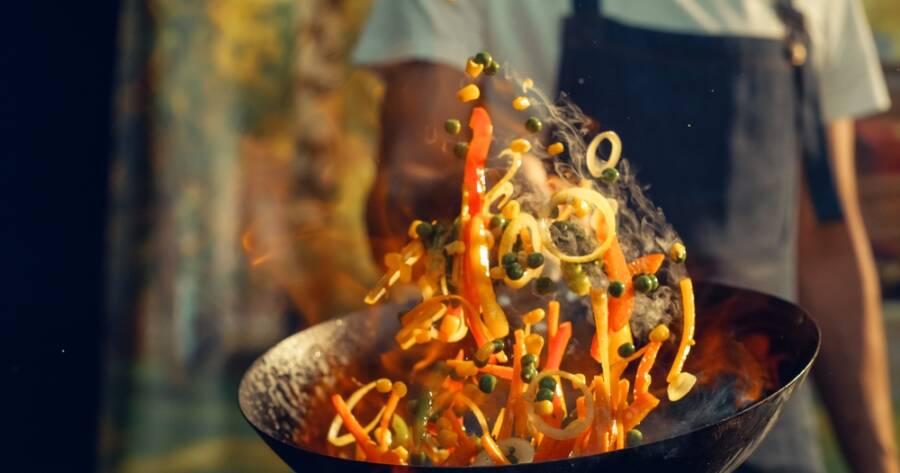Cooking is more than just following recipes; it’s about understanding fundamental techniques that can transform simple ingredients into delicious dishes. Learning a few essential cooking methods will boost your confidence and allow you to improvise, and tweak recipes to suit your taste. From grilling and braising to roasting, top cooking techniques will transform your potential in the kitchen.
1. Sautéing
Sautéing is a foundational cooking technique that involves cooking food quickly in a small amount of oil over medium-high heat. This method is perfect for preparing vegetables, chicken, or fish, allowing ingredients to develop flavor through caramelization while retaining their texture.
The key to a good sauté is making sure your pan is hot enough before adding your ingredients. If you can hear a satisfying sizzle when food hits the pan, you’re on the right track. Sautéing adds depth to dishes and helps you get comfortable working with heat.
2. Roasting
Roasting is a must-know technique, especially when it comes to vegetables, poultry, or large cuts of meat. Cooking food in an oven at high temperatures allows natural sugars to caramelize, producing a wonderful depth of flavor and crispy textures.
Whether you’re roasting a whole chicken or a medley of root vegetables, the goal is to achieve even cooking and an appealing golden-brown crust. Learning to roast correctly involves understanding how to control oven temperatures and knowing when to use oil, herbs, and seasoning for optimal flavor.
3. Braising
Braising is a slow-cooking technique that involves searing meat or vegetables, then simmering them slowly in a covered pot with liquid. This method is perfect for tougher cuts of meat, like chuck roast or short ribs, which break down over time into tender, flavorful pieces.
Braising is also great for deepening the flavors of vegetables in stews and soups. By learning how to braise, you can transform simple ingredients into comforting, hearty dishes. The key is patience—the slow cooking process is what develops richness and tenderness.
4. Boiling and Simmering
Boiling and simmering are essential techniques for making soups, pasta, and stocks. Boiling involves cooking food at high heat, while simmering uses a lower, gentler heat. Learning to master both is crucial, as boiling can be too intense for certain ingredients, leading to overcooking or breaking apart delicate foods.
Simmering, on the other hand, is ideal for letting flavors meld gradually. Practice controlling your stovetop temperature to easily switch between a rapid boil and a gentle simmer, which will make cooking a variety of dishes far easier.
5. Grilling
Grilling imparts a distinct smoky flavor to food that’s difficult to achieve with other cooking methods. Learning to grill effectively is all about understanding direct and indirect heat. For items like steak or burgers, high direct heat gives you the perfect sear. Indirect heat is ideal for larger cuts of meat that require longer cooking times, like ribs or whole chickens.
Knowing how to properly prepare your grill, whether gas or charcoal, is important to achieve the right temperature and flavor balance. With some practice, grilling can become an enjoyable way to enhance flavors and bring out the best in meats, vegetables, and even fruits.
6. Baking
Baking is more than just a cooking method—it’s a science. While it’s commonly associated with bread, cakes, and pastries, baking is also used for casseroles and other savory dishes. Mastering basic baking skills, such as accurately measuring ingredients, using the right mixing techniques, and understanding oven temperatures, is crucial for ensuring consistent results.
The difference between a flat cake and a fluffy one often comes down to small details, like properly folding ingredients or ensuring even oven heat. Once you understand the basics, baking can become a creative and rewarding culinary outlet.
7. Knife Skills
Good knife skills are fundamental in the kitchen. Learning the correct way to chop, dice, julienne, and mince ingredients not only makes cooking more efficient but also ensures even cooking.
Start by mastering the basics: the classic chopping motion, the pinch grip for control, and knowing which knife to use for each task. Practicing knife skills can make meal preparation faster and more enjoyable, and you’ll find that precise cuts also help with the presentation of your dishes.
Time to Elevate Your Cooking Skills
Mastering these essential cooking techniques will elevate your culinary skills, allowing you to prepare a variety of delicious dishes with ease and confidence. From sautéing to braising, boiling to roasting, each method brings out unique flavors and textures in food.
Practicing these techniques will also give you the flexibility to experiment in the kitchen and create dishes that suit your tastes and preferences. Whether you’re a beginner or an experienced cook looking to refine your skills, learning these techniques will ensure that you can handle any recipe and bring out the best in every ingredient you use.
